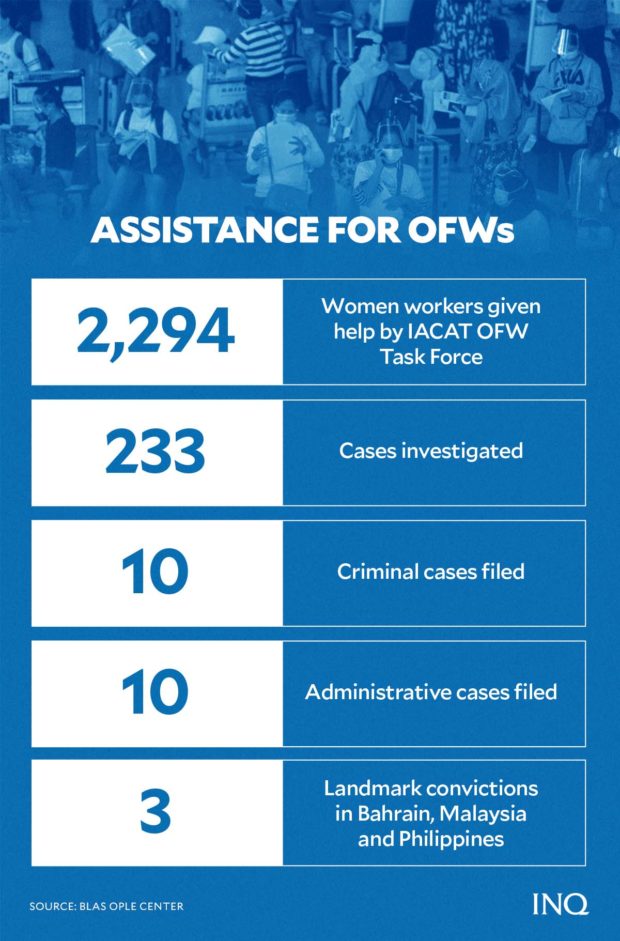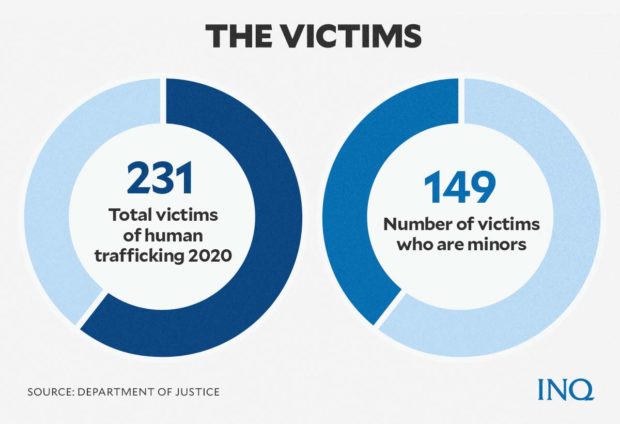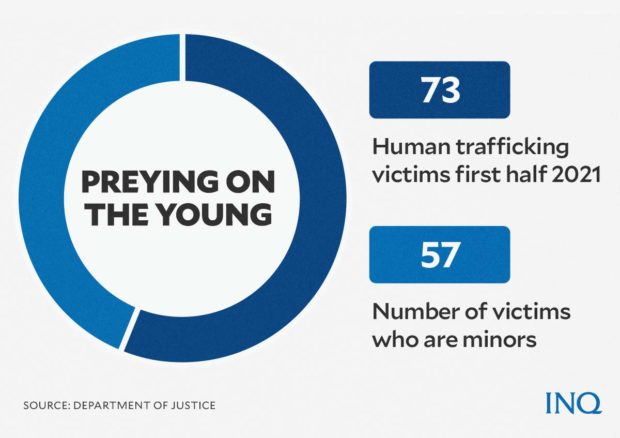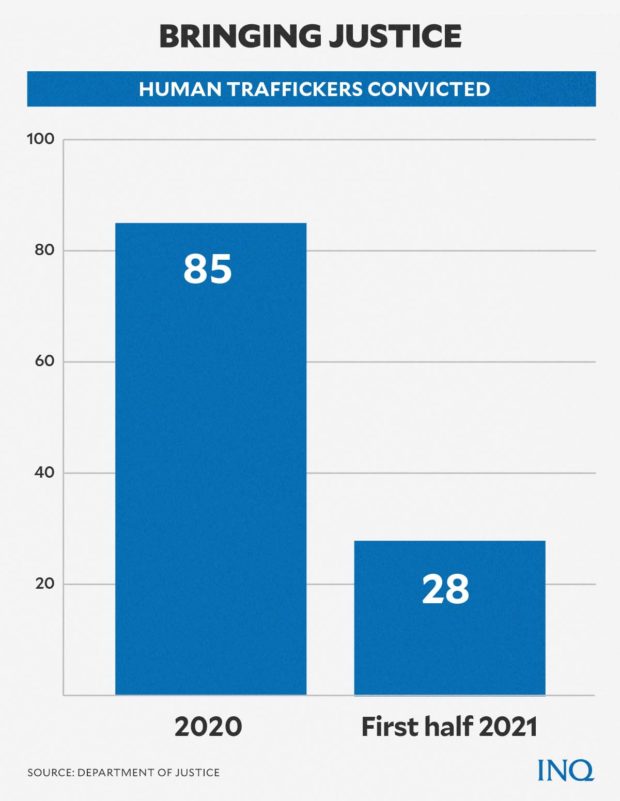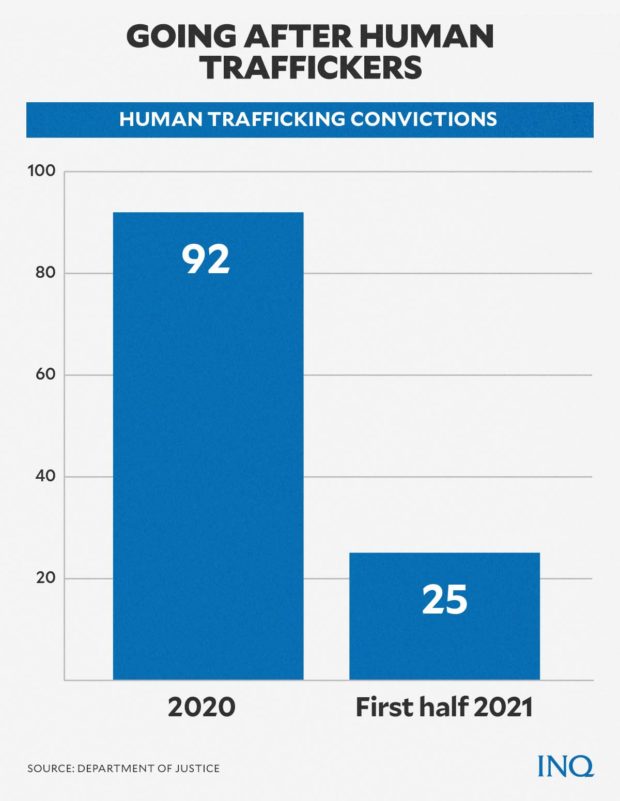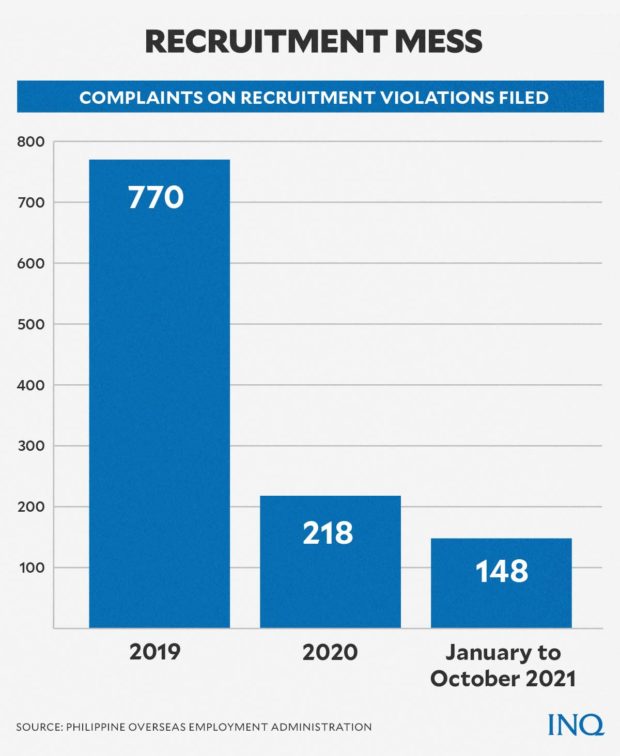High expectation on DMW: More convictions for human traffickers
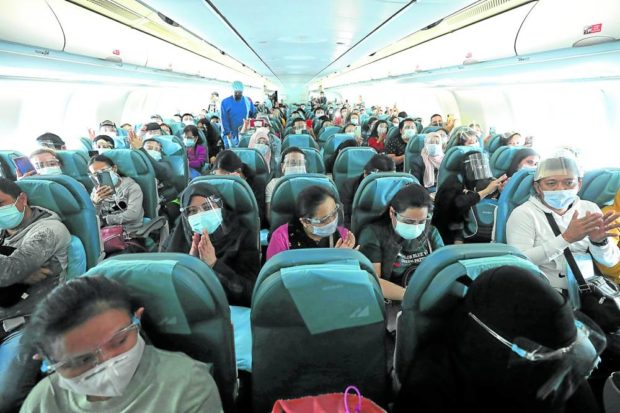
Repatriation flights continue for OFWs who are stranded abroad because of various reasons, including COVID restrictions in their places of work. FILE PHOTO
MANILA, Philippines—Human trafficking and illegal recruitment continue to prey on Filipinos hoping for a better future abroad but hope is rising that these monsters lurking in the dark would finally meet their match in a new department created solely for overseas Filipino workers (OFW).
Republic Act No. 11641—or the Department of Migrant Workers Act—was signed by President Rodrigo Duterte on Dec. 30, 2021 and was welcomed by the Coalition Against Trafficking of OFWs (CAT-OFWs), an organization composed of representatives from civil society and the private sector with technical advice and support from the ASEAN-Australia Counter Trafficking (ASEAN-ACT).
Under the new law, the Department of Migrant Workers (DMW) will absorb all powers, functions, and mandates of the Philippine Overseas Employment Administration (POEA) and will serve as the core agency under the executive branch of the government tasked with protecting the rights and promoting the welfare of OFWs.
The creation of a department dedicated to OFWs was among Duterte’s campaign promises during the 2016 presidential race. Election results showed massive support for Duterte by OFWs.
In May last year, Duterte certified as urgent the long-promised measure that sought to create the Department of Migrant Workers and Overseas Filipinos (DMWOF), which was then still pending at the Senate as Bill No. 2334.
Article continues after this advertisementREAD: Duterte certifies as urgent bill creating dep’t for migrant workers, overseas Filipinos
Article continues after this advertisementAccording to former labor undersecretary Susan Ople, one of the founders of the CAT-OFWs, the measure’s “clear and tough mandate” of pursuing cases against human trafficking syndicates and illegal recruiters allows the new department to place human trafficking and illegal recruitment issues at the top of its list of priorities.
The coalition said it expects to see an increase in the government’s human trafficking conviction rate under the new department.
DMW’s mandate on human trafficking
The DMW is also mandated to “formulate, plan, coordinate, promote, administer, and implement policies, and undertake systems for regulating, managing, and monitoring OFWs” and their reintegration while taking into consideration the national development programs formulated by the National Economic and Development Authority (Neda).
The law also aims to empower and train OFWs to help them gain appropriate skills and ensure continuous access to training and knowledge development for OFWs—which could help empower and protect Filipinos working outside the country.
As part of its functions, the DMW is set to “investigate, initiate, sue, pursue, and help prosecute” human trafficking and illegal recruitment cases, in cooperation with the Department of Justice (DOJ) and the Inter-Agency Council Against Trafficking (IACAT).
The DMW will also sit as a member of the IACAT.
Through this function, the department secretary and the authorized deputy will have the power to:
- issue subpoena to any person for investigation for illegal recruitment or trafficking in persons
- hold or cite any person in contempt as may be provided by the implementing rules and regulations
- administer oaths upon cases under investigation
- have access to all public records and to records of private parties and concerns, in accordance with the law
“With this very clear mandate, we expect a sharper focus on the investigation and prosecution of human traffickers and their accomplices in and outside government that prey on our OFWs forcing them into a life of slavery overseas,” said Luther Calderon, a non-government organization (NGO) leader and member of CAT-OFWs, in a statement.
The law also stated that the DMW, as part of its long list of powers and functions, must:
- formulate, recommend, and implement national policies, plans, programs, and guidelines that will ensure the protection of OFWs;
- regulate the recruitment, employment, and deployment of OFWs;
- support and assist the Department of Foreign Affairs (DFA) and similar government agencies in creating strong partnerships with counterpart and relevant agencies in foreign countries;
- support and assist the DFA in the negotiation of bilateral and multilateral agreements, initiatives, and programs;
- regulate the operations of private recruitment and manning agencies involved in the deployment of OFWs abroad to protect the worker’s interests and well-being;
- establish a 24/7 Emergency Response and Action Center Unit and media and social media monitoring center to respond to the emergency needs of OFWs and their families.
The new department is set to cover, assist, and protect the estimated 2.2 million OFWs abroad—according to results of the 2019 Survey on Overseas Filipinos by the Philippine Statistics Authority (PSA) released in 2020.
Blacklisting
The CAT-OFWs likewise pushed for a provision under Section 6 of RA 11641, which enables the DMW to “create a system for the blacklisting of persons, both natural and juridical, including local and foreign recruitment agents, and employers, who are involved in trafficking.”
The provision stated that the department shall have a database of blacklisted persons, which will be updated and shared within the DMW’s agencies and the IACAT. A monitoring system for cases involving trafficking and illegal recruitment should also be established.
“It’s crystal clear that the new OFW department is mandated to pursue cases against those who treat our overseas workers as slaves and commodities for sale,” said the CAT-OFWs leaders in a statement.
“It is also tasked with creating and updating a database of blacklisted persons to be shared with IACAT while also establishing a monitoring system for cases involving trafficking and illegal recruitment,” they added.
By the numbers
Human trafficking, as defined by the United Nations (UN), refers to the recruitment, transportation, transfer, harboring, or receipt of people through force, fraud, or deception, with the aim of exploiting them for profit.
A study by Alcestis “Thetis” Abrera Mangahas, former deputy regional director of International Labor Organization (ILO) for Asia Pacific, released last year revealed that illegal recruitment—which can be caused by unlicensed agencies or prohibited practices by licensed agencies—was one of the biggest struggles encountered and reported by OFWs.
Data from the IACAT OFW Task Force showed that it has assisted 2,294 women domestic workers, investigated 233 cases, and filed 10 criminal cases and 10 administrative cases—which resulted in three landmark convictions in Bahrain, Malaysia, and the Philippines.
The DOJ reported 25 convictions of human trafficking cases during the first half of 2021. Of these convictions recorded from Jan. 1 to June 30 last year, there were 28 human traffickers involved.
A total of 73 victims were involved in the cases, of whom 57 were minors while 16 were adults.
The numbers, however, were 73 percent lower than the 92 convictions recorded during the same period in 2020. At least 85 human traffickers, who victimized 231 individuals, including 149 minors, were jailed that year.
Justice Undersecretary Emmeline Aglipay-Villar explained that some courts have failed to submit reports mid-year, while others submit very late.
According to POEA director Levinson Alcantara, the agency has offered assistance in the preparation of the following complaints against licensed agencies for recruitment violations:
- 770 complaints in 2019
- 218 complaints in 2020
- 148 complaints from Jan. to Oct. 2021
It has also docketed hundreds of illegal recruitment cases during the past three years, including:
- 1,108 cases of recruitment violation in 2019
- 453 cases in 2020
- 721 cases from Jan. to Oct. 2021
READ: Illegal recruiters know no pandemic, continue to prey on OFWs
POEA Administrator Bernard Olalia previously said that due to illegal recruitment, human trafficking, and unethical recruitment by unscrupulous firms, the agency has formed a technical working group (TWG) on fair and ethical recruitment.
“With the help of different stakeholders, this TWG is tasked to assess existing policies and rules and regulations in fair and ethical recruitment with the end view of formulating a policy framework that will be implemented by the POEA,” Olalia said.
However, key findings of the study “Seeking Justice: Developing Improved OFW Feedback and Complaints Mechanisms” suggested that the recorded cases involving human trafficking and illegal recruitment could still increase since only a handful of OFW victims usually report to the authorities and seek help.
READ: OFW burden grows heavier as relief, justice fall through system gaps
“OFWs often find it untenable to seek justice under the destination country’s hardly understood institutions and fragmented laws and policies, especially when confronted with unfriendly immigration and work permit processes,” explained Mangahas at an online press conference last year.
Citing data from the 2018 National Migration Survey, Mangahas said that among OFWs who experienced contract violations and involuntary work arrangements, only a third sought help.
From those who sought help, only a few filed a complaint or case against their employer.
“There is the disturbing sense of helplessness and resignation among the respondents, an acceptance that taking action would not result in significant positive change,” said Mangahas.
High expectations
Ople had expressed concerns previously that the push for a new department solely for migrant workers and OFWs might not be able to meet high expectations.
READ: Gov’t told: Protect OFWs, new department against corruption
“The expectations of our migrant workers will be so high so it’s very important to level the people’s expectation of what this new department can accomplish,” she explained.
She has also urged the government to review existing grievance mechanisms for exploited migrant workers during Senate deliberations on the new department.
“There has to be a clear mandate for this new department to make use of the laws of other countries and relevant international agreements to hold abusive foreign employers and foreign recruitment agencies accountable for exploiting our OFWs,” Ople said.
TSB
